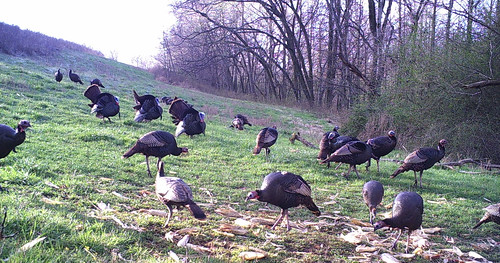
When it comes to understanding and improving turkey habitat restoration, there are few more knowledgeable than farmer Chuck Borum in Pulaski, Tennessee. Borum bought a few hundred acres a decade ago with the intent of raising cattle, but with time, he saw how he could also establish top-notch turkey habitat.
“Initially, we only had a few turkeys on the farm, and before we knew it, we had a whole slew of them because the programs we had with NRCS helped us establish a safer habitat for them to prosper,” Borum said.
Borum used NRCS’ Environmental Quality Initiatives Program (EQIP) to improve his grazing operation by installing water structures and lines for his livestock and fields. The program enabled him to establish field borders too, which happen to provide excellent habitat for turkeys.
Predators are Borum’s biggest challenge. Foxes, wolves, bobcats, and even possum (who steal turkey eggs) are a constant threat to the habitat. But because of drastic improvements in his natural barriers and fencing, it’s much easier to keep up with the predators, and more importantly, keep them out altogether.
“EQIP has helped me more than any other program I’ve used,” Borum said. “We were able to build field borders and fences around a larger area, which allowed the turkeys to flourish given they had a larger area to roam and were much safer than they had been. Rabbits and quail also gained in population, but it was the turkeys whose numbers grew exponentially.”
Not only is Borum a pioneer in restoring turkey habitat, he is also one of the first in his area to apply for EQIP. Many of the farmers and landowners in the area weren’t even aware of the benefits NRCS programs provide to customers until he made them aware of them. His peers constantly seek him out for help and advice, and because of that, the agency is now inundated with requests for technical and financial assistance.
In 2013, NRCS recognized Borum as having the Giles County Soil Conservation District Conservation Farm of the Year, an award he cherishes. The award is given to farmers who are well-rounded in the preservation of natural resources.
Borum says even after all his years in working with wildlife and habitat restoration (he worked for the Tennessee Wildlife Refuge Association for nearly 30 years), he’s still excited about what he does every day.
When asked how long he plans to do this, he smiled and responded, “For the rest of my life. I’ve got a pattern now, and I don’t want to mess that up.”
